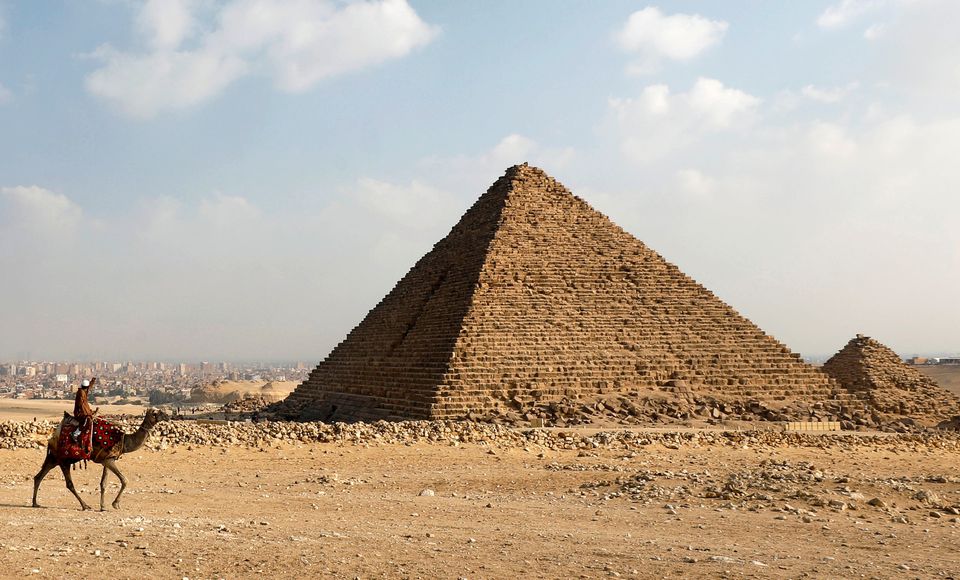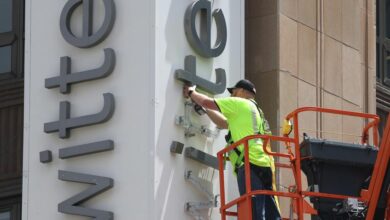A quick glance at its front page is all it takes to let the reader know that Wasla is not your average Arabic-language newspaper. For starters, there’s barely any text.
Instead, the entire front page is devoted to a large, attention-grabbing image. Against the backdrop of an Egyptian flag, a caricature of Mohamed ElBaradei stares out at the reader. The would-be presidential candidate’s skin is a bright shade of symbolic eagle-yellow. The headline states simply: “ElBaradei Fever.”
Wasla‘s content isn’t written by journalists per se, but rather by internet bloggers. Its editorial staff chooses interesting posts by Egyptian and Arab bloggers, which they then reprint in the magazine’s pages. Each featured blog entry is reprinted by permission of the author and is subject to creative commons laws, meaning it can be copied and distributed free of charge.
Throughout its 16 pages, readers will come across language, layout and an overall style refreshingly unfamiliar to anything else available on the market, meaning that the magazine’s creators have already achieved one of their goals. But whether or not this initial success will expand to include their primary objective–the introduction of writing by politically-aware bloggers to those who might not otherwise have access to them–remains to be seen.
“We originally thought of calling the magazine Al-Gisr (‘The Bridge’),” says Gamal Eid, executive director of the Arab Network for Human Rights Information (ANHRI), the non-profit organization that funds the project. “But we eventually settled on Wasla.” The name, he explains, comes from the Arabic word meaning “connection”–highly appropriate, since "connecting" is exactly what the publication aims to do.
“The idea behind Wasla is very simple,” Eid explains. “There are certain generations and groups in our society that cannot–for whatever reason–form stable connections with the online world of socially-conscious bloggers.”
Eid points out that many young people do not have consistent access to the Internet, while a good portion of those who do don’t know how to make the most of it. According to Eid, older generations have a similar problem, being typically unfamiliar with modern technologies and concepts, such as social networking.
“The older generations hear about blogging and online activism and a lot of them are interested,” says Eid. He went on to illustrate his point by recalling an encounter he had with prominent Egyptian writer Sonallah Ibrahim and Lebanese writer Elias Khoury, during which “they both expressed a great deal of interest in the whole blogging phenomenon and a desire to be a part of it.”
Eid is also concerned about members of the same generation that "don’t particularly care much for the way young bloggers express themselves online. They don’t understand the language that is being used, the youthful slang and connotations. They don’t grasp the significance of these writings. So they just criticize the whole concept.”
Upset by what he sees as "unfair generalizations," Eid hopes Wasla will convince skeptical senior citizens to reconsider their stance.
Success in this mission depends entirely on Wasla’s editorial team, which is responsible for selecting the entries reprinted in the paper and maintaining contact with bloggers throughout the Arab world.
“We focused on Egypt for our first issue,” says Ahmed Nagui, member of the paper’s editorial staff. “But in upcoming issues, we’ll be including bloggers from Morocco, the Gulf region and the entire Arab world.”
Eventually, the Wasla team hopes to reprint blog posts from across the globe. “We definitely have bigger plans for the future,” says Nagui. “We want to involve as many bloggers as possible."
For the time being, Wasla’s list of 200 contributors appears to have served them nicely. “To be quite honest, I didn’t expect the first issue to come out this well,” Nagui beams. “I’m pleasantly surprised.”
“I’m always optimistic,” laughs Eid. “Not that long ago, we didn’t have an independent press.” Today, he points out, blogging has "caught on" among young Egyptians with a vengeance.
“Blogging is the best thing to happen in Egypt in the past ten years,” he says, expressing confidence that local online activism–as well as its subsequent publication in Wasla–will grow to a become a time-honored phenomenon. “We will connect with the people,” he vows.
The first issue of Wasla was officially released on Thursday. To mark the occasion, a press conference was held at the ANHRI’s headquarters.
Wasla is free of charge, meaning that copies are extremely limited. Readers wishing to obtain a copy should visit ANHRI’s downtown office at 10 Elwi St., Apt. 5, or refer to the organization’s official website.




